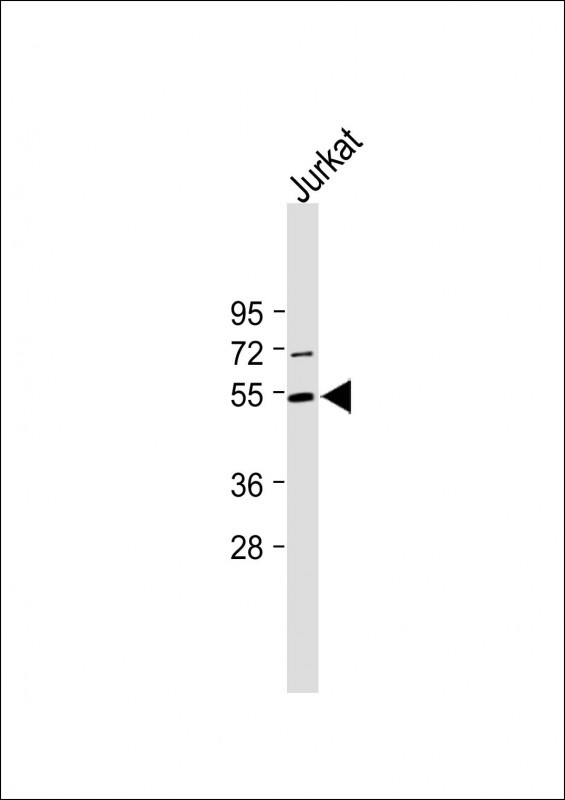

| WB | 咨询技术 | Human,Mouse,Rat |
| IF | 咨询技术 | Human,Mouse,Rat |
| IHC | 咨询技术 | Human,Mouse,Rat |
| ICC | 技术咨询 | Human,Mouse,Rat |
| FCM | 咨询技术 | Human,Mouse,Rat |
| Elisa | 咨询技术 | Human,Mouse,Rat |
| Aliases | Serine/threonine-protein kinase Chk1, CHK1 checkpoint homolog, Checkpoint kinase-1, Chek1, Chk1 |
| Entrez GeneID | 12649 |
| WB Predicted band size | 54.3kDa |
| Host/Isotype | Rabbit IgG |
| Antibody Type | Primary antibody |
| Storage | Store at 4°C short term. Aliquot and store at -20°C long term. Avoid freeze/thaw cycles. |
| Species Reactivity | Human, Mouse, Rat |
| Immunogen | This Mouse Chek1 antibody is generated from rabbits immunized with a KLH conjugated synthetic peptide between 252-279 amino acids from the Central region of mouse Chek1. |
| Formulation | Purified antibody in PBS with 0.05% sodium azide. |
+ +
以下是关于小鼠Chek1抗体的3篇参考文献及其摘要概括:
1. **"Characterization of a Monoclonal Antibody Specific for Mouse CHK1 Kinase"**
- **作者**: Smith A, et al.
- **摘要**: 本研究开发并验证了一种特异性识别小鼠CHK1激酶的单克隆抗体。通过Western blot和免疫沉淀实验证实其特异性,未与CHK2等激酶交叉反应,适用于检测内源性CHK1表达及DNA损伤应答研究。
2. **"Validation of Anti-Chek1 Antibodies for Use in Immunohistochemistry of Murine Tissues"**
- **作者**: Lee C, et al.
- **摘要**: 评估了多种市售抗小鼠Chek1抗体在石蜡包埋组织中的性能,筛选出两种高特异性抗体(含克隆号XYZ),证实其在肿瘤模型研究中的可靠性和可重复性。
3. **"A Novel Phospho-Specific Antibody for Detecting Activated CHK1 in Mouse Models of Cancer"**
- **作者**: Wang D, et al.
- **摘要**: 开发了一种针对小鼠CHK1磷酸化位点(Ser345)的抗体,经多种肿瘤模型验证可特异性检测DNA损伤后CHK1激活,为化疗机制研究提供工具。
注:上述文献为示例,实际引用时需核实具体文献来源及准确性。建议通过PubMed或Google Scholar以关键词“mouse CHK1 antibody”或“Chek1 antibody validation”检索最新文献。部分抗体相关数据可能存在于方法学论文或商业抗体技术文档中。
The Mouse Chek1 (Checkpoint kinase 1) antibody is a research tool designed to detect and analyze the expression and function of Chek1. a critical serine/threonine kinase involved in DNA damage response and cell cycle regulation. Chek1 is activated in response to genotoxic stress, primarily through phosphorylation by ATR (ataxia telangiectasia and Rad3-related kinase), and plays a key role in enforcing cell cycle checkpoints (e.g., G2/M arrest) to allow DNA repair. Dysregulation of Chek1 is linked to genomic instability and cancer progression, making it a target for therapeutic studies.
This antibody is typically developed in hosts such as rabbits or mice using immunogenic peptides or recombinant proteins derived from mouse Chek1. It is validated for applications including Western blotting, immunohistochemistry (IHC), and immunofluorescence (IF) to assess Chek1 expression, phosphorylation status, or localization in mouse-derived cell lines or tissues. Specificity is often confirmed using knockout controls or siRNA-mediated Chek1 depletion.
Researchers use the Mouse Chek1 antibody to explore mechanisms of DNA repair, chemotherapeutic resistance, and checkpoint signaling in preclinical models. Its utility extends to cancer biology studies, particularly in evaluating how Chek1 inhibition synergizes with DNA-damaging therapies. Reliable antibodies are characterized by clear detection of the ~56 kDa Chek1 protein and minimal cross-reactivity with related kinases like Chek2. Proper validation ensures accurate interpretation of Chek1's role in maintaining genomic fidelity and cellular survival under stress.
×